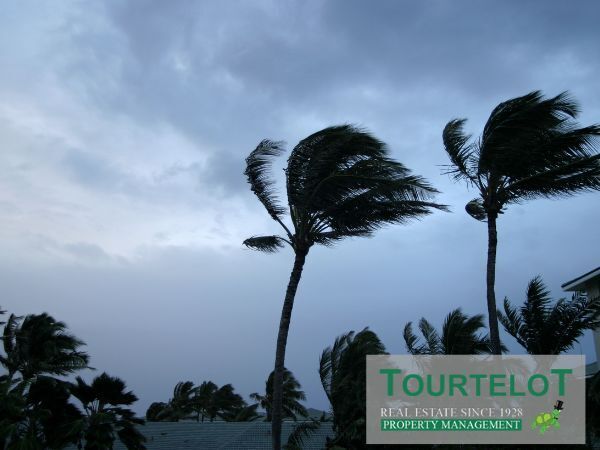
Guide for Rental Property Owners
Preparing for a hurricane in St. Petersburg means protecting your property, your tenants, and your investment from severe storms and flooding. Landlords should have a clear hurricane preparedness plan that covers emergency supplies, communication with tenants, and compliance with Pinellas County evacuation orders.
Taking action before hurricane season ensures your rental homes are safe, minimizes property damage, and keeps tenants informed during emergencies.
Quick Facts on Hurricane Preparedness in St. Petersburg
Create a hurricane plan: Outline steps for protecting property and tenants. Stock essential supplies: Battery-powered radios, flashlights, and storm kits. Know evacuation zones: St. Pete properties often lie in flood-prone areas.
Communicate with tenants: Share storm preparedness kits and evacuation info.
Inspect properties early: Secure windows, clear drains, and trim trees.
Stay connected: Use Alert Pinellas and National Weather Service updates.
Why Hurricane Preparedness Matters for Rental Property Owners
Hurricane season in Tampa Bay can bring strong winds, power outages, and significant flood waters. For property owners, the risk is two-fold: protecting your investment and ensuring tenant safety.
Proactive disaster planning reduces costly repairs and liability, while showing tenants you take their well-being seriously.
Building a Hurricane Preparedness Plan
Secure the Property
Conduct annual inspections before hurricane season. Look for loose roof tiles, weak tree branches, and clogged gutters. Reinforce windows and doors, and consider installing storm shutters for long-term protection.
Stock Emergency Supplies
Every property should have a recommended hurricane items list, including flashlights, extra batteries, bottled water, and non-perishable food. Encourage tenants to keep hurricane power outage supplies such as backup chargers, radios, and first-aid kits.
Address Flood Risks
Many St. Petersburg rentals lie in evacuation zones near Tampa Bay. Ensure your property is prepared for rising water by clearing storm drains and raising electrical systems if possible. Share local resources for pet-friendly shelters and flood evacuation routes with tenants.
Communicating with Tenants Before a Storm
Clear, early communication is vital. Send tenants reminders before hurricane season begins with links to Pinellas County Emergency Management and the City of St.
Petersburg resources. Provide a checklist for building an emergency storm kit and highlight important contacts like the hurricane center and National Weather Service.
During an active storm watch, notify tenants of evacuation orders, traffic signal outages, and safe shelter options. Encourage them to follow trusted updates on social media and through Alert Pinellas.
After the Storm: Property Owner Responsibilities
Once conditions are safe, assess your property for damage. Document property damage with photos for insurance claims. Check for downed power lines, structural damage, and water intrusion. Communicate next steps to tenants, including temporary housing if needed.
Working with a property manager or St. Petersburg property management company can streamline disaster response by coordinating repairs and handling tenant communications.
Cost Considerations for Hurricane Preparedness
Hurricane preparedness comes with upfront costs, but they are far lower than storm repair bills. Items like storm shutters, flood insurance, and storm kits are long-term
investments. Property owners can also deduct certain expenses for disaster preparedness from their taxes.
By preparing in advance, landlords save money, reduce liability, and maintain stronger relationships with tenants who feel safe in their rental homes.
FAQs:
How should landlords in St. Petersburg prepare rental homes for hurricanes?
Landlords should inspect roofs, windows, and drainage systems before hurricane season, provide tenants with preparedness guidelines, and ensure properties comply with Pinellas County evacuation orders.
Are St. Petersburg rental properties required to provide hurricane shutters?
While not all properties are legally required, installing shutters or impact-resistant windows is strongly recommended. It protects both the property and tenants during tropical storms.
What resources are available for St. Pete residents during hurricanes?
Property owners should guide tenants to Alert Pinellas, the National Weather Service, and Pinellas County Emergency Management. Pet-friendly shelters and evacuation maps are also available through the City of St. Petersburg.
Who is responsible for property damage after a hurricane?
Landlords are responsible for structural repairs, while tenants must protect their personal belongings. Encourage tenants to obtain renters’ insurance for storm-related losses.
What should be included in a hurricane storm preparedness kit?
Essentials include bottled water, non-perishable food, a flashlight, extra batteries, a battery-powered radio, first-aid supplies, and portable chargers. Tenants should prepare kits for each household member.
Contact Tourtelot Property Management to Learn More About Preparing Your Tenants and Your Rental Properties for a Hurricane
Preparing for a hurricane in St. Petersburg is an essential responsibility for every rental property owner. From emergency storm kits to flood protection, proactive planning ensures your investment is protected and your tenants remain safe during hurricane season. For expert support in property management and disaster planning, contact Tourtelot Property Management today.
Our team of experienced St. Petersburg property managers is here to safeguard your rental properties and provide peace of mind year-round.
Contact our team for more information about preparing for a hurricane in St. Petersburg.






